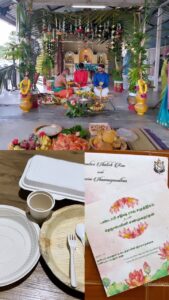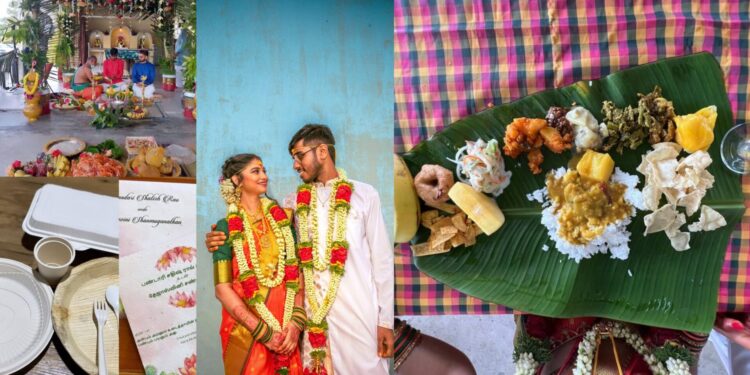Without the shimmer of silk sarees and the jangle of gold jewellery, it’s difficult to imagine an Indian wedding. The events are referred to as “huge, fat Indian weddings” all over the world because of their pomp and grandeur concept.
A typical Indian wedding consists of several rituals and segments, and the ceremony is incomplete without the presence of family and friends. Many couples spend more money on their weddings than they should.
But, after the ceremony, have you considered how much waste we generate at the end of the day?

Tejasvini Shanmuganathan and Shatish Rao’s big day became the talk of the town on social media after the couple opted for an eco-friendly and waste-free wedding.
Tejasvini and Shatish both 29, conducted a small-scale, zero-waste wedding in December and received a lot of praise from netizens.
According to Astro Ulagam, Tejasvini, who works as a process control assistant manager at a private industry in Shah Alam, said she and her husband had been on the same track about having an eco-friendly wedding since they began preparing it over a year ago.
Both individuals are opposed to food waste and the use of plastic materials, hence came to a decision to put their own principles first during the wedding.
For their wedding, biodegradable plates and cutlery made of Areca leaves (Pakku Mattai) and corn starch, photodegradable plastic bags including a serving of a 16-course wedding meal on banana leaves, and even developing and printing plantable wedding invitations were among the “green” initiatives taken at the wedding.
For the ‘Nalungu’ ceremony, the couple even had a ‘pacha panthal’ created as the wedding dais and as house décor.
Both Tejasvini’s and her husband’s families were tremendously supportive of their eco-friendly endeavour, from the planning stages to the buying of the materials required on the day of the ceremony.
They have resisted the idea that a grandiose wedding that pleases society more than the couple is required for a marriage to succeed, and have opened the path for other would-be couples to follow in their footsteps.
Previously, the son of India’s richest person, Akash Ambani and Shloka Mehta ensured that their wedding did not leave behind a trail of rubbish, and had a minimum impact on the environment.
The Ambanis reportedly ordered their wedding planner to eliminate any single-use plastic and styrofoam goods, according to idiva.

A traditional Indian wedding can easily be made zero-waste, even though most contemporary weddings have bloated to epic proportions of wastefulness. But if you dial back the pomp and show, you can easily reduce the environmental impact of the ceremony.
Follow us on Instagram, Facebook or Telegram for more updates and breaking news.








